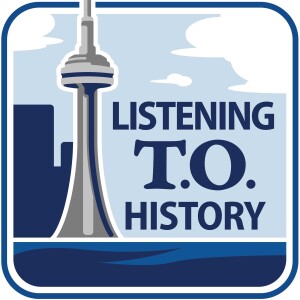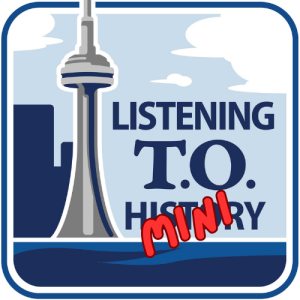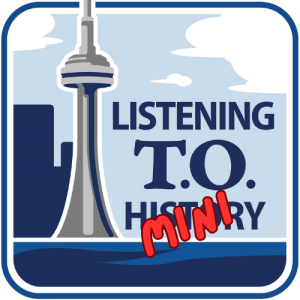Episodes

Thursday Dec 11, 2025
Thursday Dec 11, 2025
In today's episode, we discuss the classic Canadian movie Goin' Down the Road! Released in 1970, this movie tells the story of two Maritimers who come to Toronto looking for better pay and good times. We chat about the how the movie portrays Toronto at the time, and how that portrayal compares to other historical sources.
For those interested in learning more about the topics covered in this episode, check out the following sources:
Greg Marquis, "Confederation's Casualties: The 'Maritimer' as a Problem in 1960s Toronto," Acadiensis 39, no. 1 (Winter/Spring 2010): 83–107.
Geoff Pevere, Donald Shebib's Goin' Down the Road (Toronto: University of Toronto Press, 2012).
Daniel Ross, The Heart of Toronto: Corporate Power, Civic Activism, and the Remaking of Downtown Yonge Street (Vancouver: UBC Press, 2022).
Keith Whitney, "Skid Row," in The Underside of Toronto, ed. W. E. Mann (Toronto: McClelland and Stewart, 1970). Available at https://archive.org/details/undersideoftoron0000na/mode/1up.
"It's the Yonge Street Strip for Action on Saturday Night," Toronto Star, 20 September 1969, 1.
--
Listening T.O. History is created and hosted by Steve Penfold and Louis Reed-Wood. Our artwork was made by Nethkaria, our intro music was recorded by the National Promenade Band, and our outro music was created by Holizna. Follow us on Instagram (https://www.instagram.com/listeningt.o.history) and Facebook (https://www.facebook.com/people/Listening-TO-History/61553456499160/) for additional content and announcements, and get in touch at listeningTOhistory[at]gmail.com!

Tuesday Oct 14, 2025
Tuesday Oct 14, 2025
On today's episode, we discuss student activism at the University of Toronto in the 1960s and '70s, with a specific focus on a conflict over who was allowed to access the stacks at Robarts Library. It’s also a chance to talk about how the university changed from the late nineteenth century, the last time we covered its history, to the 1970s!
For those interested in learning more about the topics covered in this episode, check out the following sources:
Martin Friedland, The University of Toronto: A History, 2nd ed. (Toronto: University of Toronto Press, 2013)
Doug Owram, Born at the Right Time: A History of the Baby-Boom Generation (Toronto: University of Toronto Press, 1996)
Kenneth Cmiel, "The Politics of Civility," in The Sixties: From Memory to History, ed. David Farber (Chapel Hill: University of North Carolina Press, 1994)
Karen Dubinsky, Catherine Krull, Susan Lord, Sean Mills, and Scott Rutherford, eds., New World Coming: The Sixties and the Shaping of Global Consciousness (Toronto: Between the Lines, 2009)
--
Listening T.O. History is created and hosted by Steve Penfold and Louis Reed-Wood. Our artwork was made by Nethkaria, our intro music was recorded by the National Promenade Band, and our outro music was created by Holizna. Follow us on Instagram (https://www.instagram.com/listeningt.o.history) and Facebook (https://www.facebook.com/people/Listening-TO-History/61553456499160/) for additional content and announcements, and get in touch at listeningTOhistory[at]gmail.com!

Wednesday Jul 16, 2025
Wednesday Jul 16, 2025
In today's mini, we talk about how Toronto has voted in Canada's federal elections of the past.
Here are some resources for those interested in learning more about the history of Toronto and federal elections, or the history of Canadian federal elections more generally:
Stephen Clarkson, The Big Red Machine: How the Liberal Party Dominates Canadian Politics (Vancouver: UBC Press, 2005).
Cara Spittal, “The Diefenbaker Moment” (PhD diss., University of Toronto, 2011).
Thirstan Falconer, “Building an Ethnic Coalition? The Liberal Party of Canada, Ethnocultural Communities and the 1962 and 1963 Federal Elections in Metro Toronto,” American Review of Canadian Studies 48, no. 3 (2018): 281–296.
Eerik Riivo Ilves, “New-Build Gentrification and the Changing Inner City Vote in Toronto and Vancouver” (master's thesis, University of Toronto, 2007).
And if you're interested in exploring past election results yourself, you can find them here: https://lop.parl.ca/sites/ParlInfo/default/en_CA/ElectionsRidings/electionsElectedCandidates.
--
Listening T.O. History is created and hosted by Steve Penfold and Louis Reed-Wood. Our artwork was made by Nethkaria, and our music was created by Holizna. Follow us on Instagram (https://www.instagram.com/listeningt.o.history) and Facebook (https://www.facebook.com/people/Listening-TO-History/61553456499160/) for additional content and announcements, and get in touch at listeningTOhistory[at]gmail.com!

Tuesday May 13, 2025
Tuesday May 13, 2025
In today's mini, we discuss the history of Toronto in Ontario provincial elections. If you'd like to explore for yourself the results of Ontario's elections throughout the province's post-Confederation history, check out this database: https://results.elections.on.ca/en/data-explorer?fromYear=1867&toYear=2025!
--
Listening T.O. History is created and hosted by Steve Penfold and Louis Reed-Wood. Our artwork was made by Nethkaria, and our music was created by Holizna. Follow us on Instagram (https://www.instagram.com/listeningt.o.history) and Facebook (https://www.facebook.com/people/Listening-TO-History/61553456499160/) for additional content and announcements, and get in touch at listeningTOhistory[at]gmail.com!

Tuesday Mar 11, 2025
Tuesday Mar 11, 2025
In our first-ever Listening T.O. Mini, we discuss the history of free trade and tariffs in Canada's and Toronto's history. In particular, we focus on 1911, when a group of Toronto elites who had supported the Liberal Party broke with it over the party's pursuit of a free trade agreement with the United States. We also discuss the federal election held later that year (which was largely a referendum on the proposed agreement) and how Toronto voted in it.
A few additional sources, for those who are interested:
Paul Stevens, The 1911 General Election: A Study in Canadian Politics (Toronto: Copp Clark, 1970)
Patrice Dutil and David MacKenzie, Canada 1911: The Decisive Election that Shaped the Country (Toronto: Dundurn Press, 2011)
The Manifesto of the Toronto Eighteen, in the Toronto World, 20 February 1911, accessible at https://www.canadiana.ca/view/oocihm.N_00367_19110220/1
--
Listening T.O. History is created and hosted by Steve Penfold and Louis Reed-Wood. Our artwork was made by Nethkaria, and our music was created by Holizna. Follow us on Instagram (https://www.instagram.com/listeningt.o.history) and Facebook (https://www.facebook.com/people/Listening-TO-History/61553456499160/) for additional content and announcements, and get in touch at listeningTOhistory[at]gmail.com!

Friday Feb 14, 2025
Friday Feb 14, 2025
This episode is the first of a two-part series on the history of the TTC, and particularly streetcars, in Toronto! In these two episodes, we get into how Toronto's streetcar system came to be, why it moved from private business to a municipal agency, why the city kept using streetcars when other cities got rid of them, and how streetcars have shaped the development of the city. We also get into the history of streetcars from various perspectives—those of riders, workers, and owners.
The early period of public transit in Toronto, the focus of this first episode, is a surprising tale of conflicts between gilded-age industrialists clashing with city hall, their workers, and the public more generally—a tale of the conflict between private profit and public good.
For those interested in learning more, here are some further resources we used in putting together these episodes:
Brian Doucet and Michael Doucet, Streetcars and the Shifting Geographies of Toronto: A Visual Analysis of Change (Toronto: University of Toronto Press, 2022)
Michael J. Doucet, “Mass Transit and the Failure of Private Ownership: The Case of Toronto in the Early Twentieth Century” Urban History Review 6, no. 3-77 (February 1978), 3–33
Donald Davis, “Mass Transit and Private Ownership: An alternative Perspective on the Case of Toronto” Urban History Review 7, no. 3 (February 1979), 60–98
Christopher Armstrong and H.V. Nelles, The Revenge of the Methodist Bicycle Company: Sunday Streetcars and Municipal Reform in Toronto (Don Mills: Oxford University Press, 1977)
Howard Levine, ”Streetcars for Toronto Committee: A Case Study of Citizen Advocacy in Transit Planning and Operations” Transportation Research Board Special Report, Issue 221, 1989, 190–198
Jay Young, “Search for a Better Way: Subway Life and Metropolitan Growth in Toronto, 1942–78” (PhD diss., York University, 2012)
Jonathan English, “The Better Way: Transit Service and Demand in Metropolitan Toronto, 1953–1990” (PhD diss., Columbia University, 2021)
Steve Munro’s Transit blog: https://stevemunro.ca
Sean Marshall’s transit blog: https://seanmarshall.ca/blog/
--
Listening T.O. History is created and hosted by Steve Penfold and Louis Reed-Wood. Our artwork was made by Nethkaria, our intro music was recorded by the National Promenade Band, and our outro music was created by Holizna. Follow us on Instagram (https://www.instagram.com/listeningt.o.history) and Facebook (https://www.facebook.com/people/Listening-TO-History/61553456499160/) for additional content and announcements, and get in touch at listeningTOhistory[at]gmail.com!

Friday Nov 22, 2024
Friday Nov 22, 2024
When you think about student protest movements, you probably don’t think about the Victorian era. But maybe you should—because in 1895, University of Toronto students challenged the university’s administration by going on strike! In this episode, we discuss what led to this protest, what happened during the strike, and campus life/culture in the nineteenth century more broadly.
Here are some recommendations for further reading:
Martin Friedland, The University of Toronto: A History, 2nd ed. (Toronto: University of Toronto Press, 2013).
Robert Craig Brown, Arts and Science at Toronto: A History, 1827–1990 (Toronto: University of Toronto Press, 2013).
Keith Walden, “Respectable Hooligans: Male Toronto College Students Celebrate Hallowe’en, 1884–1910,” Canadian Historical Review 68, no. 1 (March 1987): 1–34.
Caitlin Harvey, “University Land Grabs: Indigenous Dispossession and the Universities of Toronto and Manitoba,” Canadian Historical Review 104, no. 4 (December 2023): 467–93.
For anyone interested in what the University of Toronto was like in this period, also check out the university's calendar (essentially, its handbook) for the year of the strike—it's pretty interesting to flip through and compare to today! https://archive.org/details/uoftcalendar1894/
--
Listening T.O. History is created and hosted by Steve Penfold and Louis Reed-Wood. Our artwork was made by Nethkaria, our intro music was recorded by the National Promenade Band, and our outro music was created by Holizna. Follow us on Instagram (https://www.instagram.com/listeningt.o.history) and Facebook (https://www.facebook.com/people/Listening-TO-History/61553456499160/) for additional content and announcements, and get in touch at listeningTOhistory[at]gmail.com!

Wednesday Sep 04, 2024
Wednesday Sep 04, 2024
For over a hundred years, Toronto was a stronghold of the Orange Order—a fraternal society founded on principles of militant Protestantism and loyalty to the British Crown—and Toronto's many Orangemen worked to marginalize the city's Irish Catholic population. In an episode that takes us from riots in the streets all the way to City Hall, we talk about what Orangeism was, why people got involved with it (and eventually stopped getting involved with it), what life was sometimes like for Irish Catholics in a bastion of Orangeism, and what all this tells us about Toronto's history.
Some additional resources related to the topics covered in this episode:
Donald Harman Akenson, The Irish in Ontario: A Study in Rural History, 2nd ed. (Montreal: McGill-Queen’s University Press, 1999).
Cecil J. Houston and William J. Smyth, The Sash Canada Wore: A Historical Geography of the Orange Order in Canada (Toronto: University of Toronto Press, 1980).
Gregory S. Kealey, “Orangemen and the Corporation: The Politics of Class during the Union of the Canadas,” in Forging a Consensus: Historical Essays on Toronto, ed. Victor L. Russell (Toronto: University of Toronto Press, 1984), 41–86.
Ian Radforth, “Collective Rights, Liberal Discourse, and Public Order: The Clash over Catholic Processions in Mid-Victorian Toronto,” Canadian Historical Review 95, no. 4 (2014): 511–544.
Ian Radforth, Royal Spectacle: The 1860 Visit of the Prince of Wales to Canada and the United States (Toronto: University of Toronto Press, 2004).
William J. Smyth, Toronto, the Belfast of Canada: The Orange Order and the Shaping of Municipal Culture (Toronto: University of Toronto Press, 2015).
David A. Wilson, ed., The Orange Order in Canada (Dublin: Four Courts Press, 2007).
If you are interested in further exploring some primary sources used in the episode, see below:
The document from which we sourced the Orange oath is available online: Forms and Ritual of the Orange Order, to be Observed in Private Lodges of the Orange Association of British North America (Cobourg: “The Cobourg Star” Office, 1846). https://hdl.handle.net/2027/aeu.ark:/13960/t9p27z069
Many issues of the Irish Canadian, the newspaper from which we quoted a few times in the episode, are available online via Google News’s database of historic newspapers: https://news.google.com/newspapers?nid=M3NEmzRMIkIC
--
Listening T.O. History is created and hosted by Steve Penfold and Louis Reed-Wood. Our artwork was made by Nethkaria, our intro music was recorded by the National Promenade Band, and our outro music was created by Holizna. Follow us on Instagram (https://www.instagram.com/listeningt.o.history) and Facebook (https://www.facebook.com/people/Listening-TO-History/61553456499160/) for additional content and announcements, and get in touch at listeningTOhistory[at]gmail.com!

Friday Jun 28, 2024
Friday Jun 28, 2024
In 1885, more than 500 Torontonians headed to the Northwest to defend settler colonialism against a Métis resistance led by Louis Riel. In this episode, we wonder why a monument to these volunteers sits at Queen’s Park, why Toronto became so interested in the prairies in the mid-nineteenth century, and what role Toronto had in settler colonialism in the West. We reflect on how the power of Toronto has always been to project outward to places far away.
Some additional resources related to today’s topics:
Ian Radforth, "Celebrating the Suppression of the North-West Resistance of 1885: The Toronto Press and the Militia Volunteers," Histoire sociale/Social History 47, no. 95 (2014): 601–39.
Doug Owram, Promise of Eden: The Canadian Expansionist Movement and the Idea of the West, 1856–1900 (Toronto: University of Toronto Press, 1980).
J. M. S. Careless, Toronto to 1918: An Illustrated History (Toronto: Lorimer, 1984).
Jean Teillet, The North-West is Our Mother: The Story of Louis Riel’s People, the Métis Nation (Toronto: Patrick Crean Editions/HarperCollins, 2019).
Gerald Friesen, The Canadian Prairies: A History (Toronto: University of Toronto Press, 1984).
--
Listening T.O. History is created and hosted by Steve Penfold and Louis Reed-Wood. Our artwork was made by Nethkaria, our intro music was recorded by the National Promenade Band, and our outro music was created by Holizna. Follow us on Instagram (https://www.instagram.com/listeningt.o.history) and Facebook (https://www.facebook.com/people/Listening-TO-History/61553456499160/) for additional content and announcements, and get in touch at listeningTOhistory[at]gmail.com!

Friday May 24, 2024
Friday May 24, 2024
In this episode, we discuss the career of one of history’s most famous Torontonians, William Lyon Mackenzie. Those of you who know your Canadian history have probably heard of Mackenzie; in the late 1830s he famously led a failed rebellion against the government of Upper Canada. Less well known about Mackenzie, though, is that just a few years before that rebellion he actually served as the city of Toronto’s first mayor.
So in this episode, we discuss not only Mackenzie himself, but also politics in Toronto’s early history. Why did the town of York incorporate as the city of Toronto in 1834, and what did it mean to do so? What were the major issues of the day in the city? And what were the priorities of Toronto’s first government? We discuss all this and more in this episode.
Some additional resources related to today’s topics:
Paul Romney, "William Lyon Mackenzie as Mayor of Toronto," Canadian Historical Review 56, no. 4 (December 1975): 416–436.
F.H. Armstrong, "William Lyon Mackenzie, First Mayor of Toronto: A Study of a Critic in Power," Canadian Historical Review 48, no. 4 (December 1967): 309–331.
Mark Maloney, Toronto's Mayors: A History of the City's Leaders (Toronto: Dundurn Press, 2023).
Michel Ducharme, The Idea of Liberty in Canada during the Age of Atlantic Revolutions, 1776–1838 (Montreal: McGill-Queen’s University Press, 2014).
--
Listening T.O. History is created and hosted by Steve Penfold and Louis Reed-Wood. Our artwork was made by Nethkaria, our intro music was recorded by the National Promenade Band, and our outro music was created by Holizna. Follow us on Instagram (https://www.instagram.com/listeningt.o.history) and Facebook (https://www.facebook.com/people/Listening-TO-History/61553456499160/) for additional content and announcements, and get in touch at listeningTOhistory[at]gmail.com!








